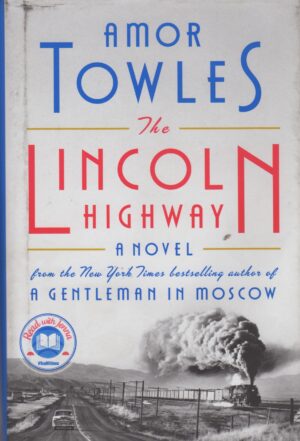
The Lincoln Highway by Amor Towles (2021. Viking. ISBN 978-0-7352-2235-9)
Love it or sort of like it. No one I’ve talked to who’s read this very long, winding epistle from the road, actually hates it. Readers appear to fall into two distinct camps: those who adore the book and those who can take it or leave it. After spending inordinate time slogging through this lengthy tome, I find myself in the later camp.
Towles begins his story in southern Nebraska, not far from the Kansas state line, in the little farming community of Morgan. In the first chapter, we’re introduced to Emmett Watson, eighteen years old, traveling in the back of a car driven by the warden of the reformatory where Emmett did time for manslaughter. At the Watson farm, we meet Emmett’s eight year old brother, Billy, a precociously strange child who is, in a word, a savant genius and wise beyond his years. Shortly after the warden deposits Emmett on the family farmstead, we learn two other inmates from the reformatory; the troublemaking yet lovable Duchess and his affable and nondescript (at least to me) sidekick, Woolly; have hidden themselves in the warden’s car trunk to escape their youthful prison. The patriarch of the Watson family is dead, having failed miserably as a farmer, and so the two boys decide to set out in search of their mother who left the dusty plains for San Francisco years before.
What transpires is a convoluted, unexciting, mundane, slow-moving trip, not west, to California, but east to New York City. I quickly became uninterested in the boys’ journey (the two escapees being part of the drive east on the book’s namesake highway), finding little to pique my interest beyond the insertion of Sally, a local gal who may or may not be Emmitt’s love interest, and the mysterious Preacher, a Black tramp the Watson boys befriend after hoping a train (their car having been “borrowed” by Duchess). It’s not that Towles can’t write. He clearly can. But as a storyteller, the principle job of an author dabbling in fiction, I found the boys’ journey, both literary and descriptive, to be unduly tedious. It took three hundred pages into this long, long saga of nuance for me to say, “OK, there’s enough here for me to see it through.” Not what I’d call a sterling endorsement.
After that, I found myself digging in and enjoying the storyline as all four boys scurried around New York City trying to figure out their collective or separate destinies. But then, in supremely disappointing fashion, as if the writer of this long, meandering road journey ran out of gas, I came to an ending that left me thinking, “What was the fucking point?” Sorry to swear but that’s what I actually said when I closed the cover on this one, folks.
Love it or tolerate it. I didn’t end up hating this book (despite my rant) but the invocation of an eight-year-old genius protagonist began this tale’s long, slow descent into disbelief. From the book’s onset, I couldn’t buy into the character of Billy, one of the four main actors on Towels’s stage. He seems, as I think about the book, a weak attempt by the writer to avoid writing in the guise of a child by cloaking Billy with wisdom, intellect, and insight that, as a dad of four sons, doesn’t ring true no matter how smart the kid is. That strained depiction of character started my questioning of this story, questioning that briefly abated but then became full-blown skepticism when I reached the novel’s uninspired conclusion.
Maybe you will see things differently. Maybe not.
Peace
2 and 1/2 stars out of 5. Book clubs seem to love this novel and I can’t figure out why.
Mark


